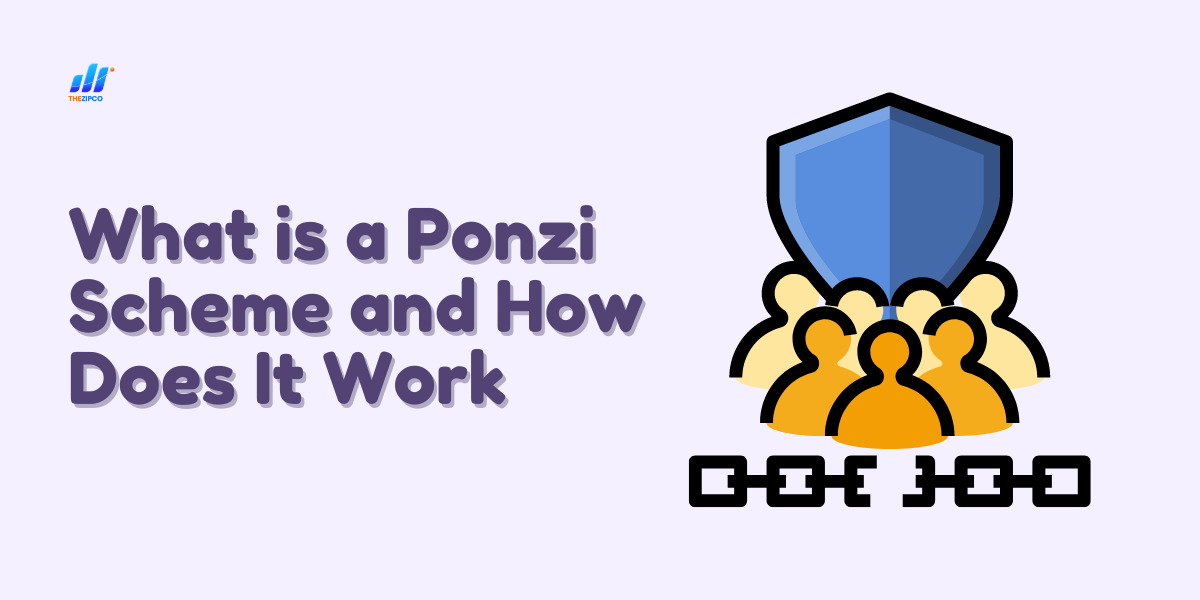When individuals invest their money, they anticipate it being directed toward a legitimate business that provides a genuine product or service, aiming to generate profits. Unfortunately, some fraudsters mislead investors by diverting their funds into fake companies or fraudulent schemes with the intention of stealing the money. This form of deception is called a Ponzi scheme.
In this guide, you will learn how Ponzi schemes operate and how to safeguard yourself from falling victim to these scams.

What is Ponzi Scheme Meaning
The Ponzi scheme is named after Charles Ponzi, who deceived investors in the 1920s with a fraudulent postage stamp investment. In this type of scam, the promoters use money from new investors to pay returns to earlier investors, creating a cycle of investment fraud.
Typically, organizers attract participants by promising high returns with little to no risk. However, instead of investing the funds as promised, they use the money to pay off previous investors while keeping a portion for their own gain.
How Do Ponzi Schemes Work
Ponzi scheme promoters lure investors by promising returns significantly higher than the market average. Instead of generating real profits, they use the funds from new investors to pay the returns, giving the illusion of a successful investment. This creates a false sense of confidence, as investors may not question how such high returns are possible or fully understand the investment details.
Because the scheme seems highly profitable, investors often share it with friends and family, encouraging them to participate. Fraudsters often target close-knit communities, such as religious groups, to recruit more participants, resulting in hundreds of victims.
Unlike some scams, a Ponzi scheme typically doesn’t require you to recruit others or take specific actions, but it relies on your enthusiasm to spread the word and bring in new investors.
Real-Life Example of Ponzi Scam
A recent report disclosed that authorities in Alabama, U.S., have charged a 23-year-old man from Gandhinagar, India, for orchestrating a $400,000 Ponzi scheme. He convinced individuals to invest by promising substantial returns and assuring them that their principal was secure. However, instead of making legitimate investments, he diverted the funds for gambling, personal expenses, and paying off earlier investors.
The man also demanded additional fees from investors to “maintain” their investments, though no actual investments were made. Furthermore, he was not authorized to sell securities in Alabama, and the investment contracts he offered were unregistered, rendering the entire operation illegal.
Common Warning Signs of a Ponzi Scheme
Ponzi schemes, whether in India or elsewhere, tend to share similar characteristics. To protect yourself, be aware of the following red flags:
- Promises of High Returns with Little or No Risk
Every investment carries some degree of risk, and higher returns typically come with higher risks. Be wary of any investment that guarantees high returns with no risk involved. - Consistently High Returns
Investment values naturally fluctuate over time. If an investment consistently delivers high returns, regardless of market conditions, it’s a sign to be cautious. - Unregistered Investments
Ponzi schemes often involve investments that are not registered with state regulators. Registration is critical because it provides transparency about the company’s management, products, and financial health. - Unlicensed Sellers
In India, investment professionals and firms must be licensed or registered under the regulations of the Securities and Exchange Board of India (SEBI). Be cautious of anyone offering investment opportunities without proper licensing. - Secretive or Complicated Strategies
Avoid investments that are difficult to understand or lack clear, detailed information. If the strategy behind the investment seems overly complex or secretive, it’s a warning sign. - Issues with Paperwork
Errors or inconsistencies in account statements may indicate that your funds are not being invested as promised. - Trouble Accessing Payments
Difficulty withdrawing funds or receiving payments is another red flag. Ponzi scheme operators often try to delay payouts by enticing investors to stay with promises of even higher returns.
Conclusion
Being aware of the risks associated with Ponzi schemes is essential for safeguarding your investments. By identifying the warning signs early and acting promptly, you can steer clear of these fraudulent operations. Always ensure that any investment opportunity is legitimate, and be skeptical of promises that appear overly attractive or too good to be true.
Keep reading and supporting thezipco!
Disclaimer: This information is added only for informative purposes and collected from different sources across the Internet. Thezipco is not promoting or recommending anything here. Please verify the information before making any decisions.

